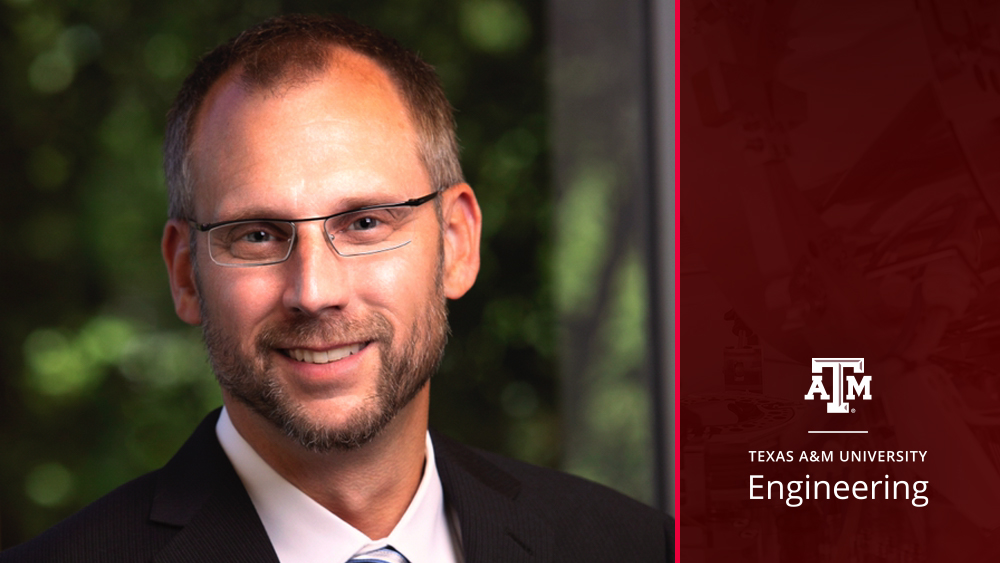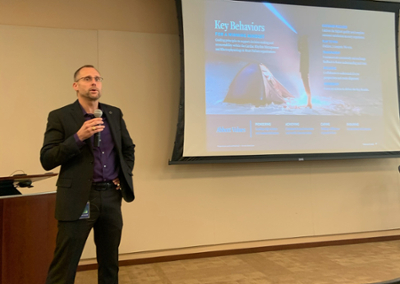
Scott Salys, Class of ’96, is the divisional vice president of Heart Failure operations at Abbott, a medical device company. Heart Failure operations is a franchise within Abbott’s medical device segment focused on implantable and nonimplantable heart pumps as well heart failure monitoring systems. Salys has more than 20 years of industry experience and has expertise in research and development (R&D), operations, supply chain, program management, process development, marketing and customer engagement.
However, that was not the original plan.
In high school, Salys was set to pursue geophysics, although he wasn’t set in which direction his career would go. However, in his senior year of high school, he was hospitalized on and off for about a year.
“During that time, I was doing my own research online, trying to understand my illness and the physiology,” Salys said. “It was during this time I started to learn how the body works. That is where my passion around the biomedical side of things started, having to personally go through extended time in the hospital. That changed my course.”
Salys transferred from the Colorado School of Mines to study bioengineering at Texas A&M University during his sophomore year and said he has loved the field since.
“The human body is the most amazing machine and system you can work on,” Salys said. “That’s how I got into this field and I’m glad I did. It’s been tremendously rewarding.”
One major accomplishment toward his career path was a co-op he did with a pacemaker company out of Houston. In addition to firmly establishing his passion with R&D, he said it was instrumental in providing career options upon graduation. Having a resume with directly relevant work experience and tangible R&D achievements caught the interest of recruiting companies and provided topics to discuss in interviews.
“The work experience allows you to pick a company that you believe has the most potential, and that’s going to cascade your career,” Salys said. “I think getting the right entry point is important, and the best way to get that right entry point is having work experience that’s relevant… where you can demonstrate your capabilities in an interview.”
One of the most rewarding courses he took in the biomedical engineering program was physiology and anatomy. Understanding how the human body is an electrical, mechanical and chemical machine cemented the passion toward biomedical engineering. He also said he appreciated the general camaraderie in the department.
“Camaraderie goes a long way in the business world too,” he said. “Being in a culture that really emphasizes this is something that students will benefit from and you may not get at other universities.”

After graduation, Salys went to work in R&D at Cyberonics, a company focused on neuromodulation for the treatment of epilepsy. Three years later, he was approached with the opportunity to move to California and join a larger company, St. Jude Medical, that focused on cardiac rhythm management and the design of pacemakers and defibrillators.
While there, he made his way through different R&D positions, starting as an individual contributor in leads development, to expanding his role to managing increasingly larger organizations.
At this point, Salys knew he wanted to expand his experience outside of R&D and have a broader overall business understanding, so he transferred within the company to St. Jude’s Neuromodulation Division in Dallas. There he rotated through vice president of Program Management, vice president of Operations and vice president of Supply Chain roles. He later moved backed to California where he managed the Supply Chain for Neuromodulation and Cardiac Rhythm Management branches businesses.
“Let them know what your interests are, and then see if there is a business need that matches up with your aspirations or where you want to go,” Salys said. “Some of it’s random timing and what the business needs at a given point in time. Your skill sets need to match the company needs.”
Salys moved to Silicon Valley in 2015 after St Jude Medical acquired Thoratec, a heart pump company. St. Jude Medical was acquired by Abbott in 2017.
Throughout his career, Salys said he has faced many challenges but was successful through persistence and staying focused on adding value.
“There were challenging times that I was working 18-hour days, working on weekends. But at the end, when it’s all successful, it develops you and you feel good about it. It’s rewarding at the end of it all. The challenging times are the most rewarding in my experience,” Salys said.
Along with developing technical skills and know-how, Salys said improving communication and collaboration skills is vital.
“How well you communicate and build relationships is critical,” he said. “In order to move projects through, it takes a lot of collaboration with others in different areas. People who are collaborative and have strong at interpersonal skills are more successful.”
Salys also encouraged students to explore many different career path options when they graduate, saying there are many entry points for engineers including areas such as R&D, operations, regulatory and field roles with direct physician interaction.
“You’re not going to be able to mastermind your career trajectory. Some of it just happens, so I never tried to over plan it,” Salys said. “As you go through your career, you should have a general trajectory in mind and take on opportunities that lead in that direction. Put your name in the hat for those next opportunities.”